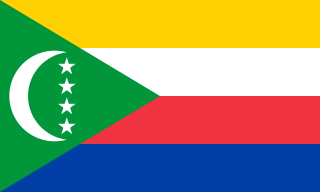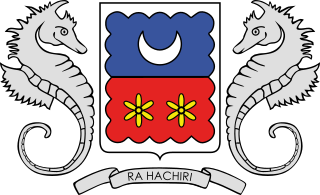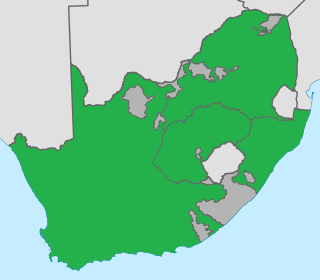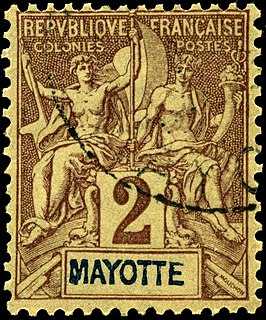
The Comoros, officially the Union of the Comoros, is an island country in the Indian Ocean located at the northern end of the Mozambique Channel off the eastern coast of Africa between northeastern Mozambique, the French region of Mayotte, and northwestern Madagascar. The capital and largest city in Comoros is Moroni. The religion of the majority of the population is Sunni Islam.

The politics of Mayotte takes place in a framework of a French overseas region and department, until 2011 an overseas collectivity. Local politics takes place in a parliamentary representative democratic setting whereby the President of the General Council is the head of government, of a multi-party system. Executive power is exercised by the government. The status of Mayotte changed in 2001 towards one very close to the status of the départements of mainland France, with the particular designation of collectivité départementale, although the island is still claimed by the Comoros. This change was approved by 73% at a referendum on Mayotte. After the constitutional reform of 2003 it became a collectivité d'outre-mer while keeping the title collectivité départementale de Mayotte. Mayotte became an overseas department of France on 31 March 2011 following the result of the March 2009 Mahoran status referendum, which was overwhelmingly approved by around 95% of voters.

This is a historical timeline of Portugal.

A referendum on a new constitution was held in South Africa on 2 November 1983 in which the white population was given the opportunity to approve or reject the Constitution of 1983. This constitution introduced the Tricameral Parliament, in which coloured and Indian South Africans would be represented in separate parliamentary chambers, while black South Africans would remain unrepresented. The referendum passed with 66.3% of voters voting "Yes"; consequently the new constitution came into force on 3 September 1984.

The French Republic is a charter member of the United Nations and one of five permanent members of the UN Security Council. The nation originally joined the UN as the Provisional Government of the French Republic (PGFR) before being succeeded by the French Fourth Republic in 1946, however, after a series of crises, the French Fourth Republic collapsed. A constitutional referendum was held on 28 September 1958; 82.6% voted for constitution for the French Fifth Republic, which succeeded the seat of the former Fourth Republic, including its permanent membership on the United Nations Security Council.

The Western Sahara Autonomy Proposal is an initiative, proposed by Morocco in 2006 as a possible solution to the Western Sahara conflict. In 2006 the Moroccan Royal Advisory Council for Saharan Affairs (CORCAS) proposed a plan for the autonomy of Western Sahara and made visits to a number of countries to explain the proposal. The Spanish approach to regional autonomy has been named as a possible model for Western Saharan autonomy, mentioning specifically the cases of the Canary Islands, the Basque Country, Andalusia or Catalonia. The plan was presented to the UN Security Council in April 2007, and has received the backing of the USA and France. This initiative constitutes the main ground for the Moroccan proposal at Manhasset negotiations.

This is an overview of the postage stamps and postal history of the Indian Ocean island of Mayotte, one of the Comoros Archipelago islands located on the south-east side of Africa.

An independence referendum was held in the Comoros on 22 December 1974. The overall result was a strong "yes" vote, with 94.57% of voters voting for independence and almost all the "no" votes being cast in Mayotte, where there was a majority for remaining under French control. In contrast, on Mohéli only five out of 6,059 votes were against independence. Voter turnout was 93.3%.

A referendum on building a bypass for Vaduz and Schaan was held in Liechtenstein on 19 September 1976. The proposal was rejected by 80.2% of voters.
Two referendums were held in Switzerland in 1876. The first was held on 23 April on the subject of distributing and cashing of banknotes, and was rejected by 61.7% of voters. The second was held on 9 July on a federal law on taxation of compensation for not serving in the military, and was rejected by 54.2% of voters.
Three referendums were held in Switzerland in 1882. Two were held on 30 July on copyright law and measures against epidemics, both of which were rejected. The third was held on 26 November on executing article 27 of the federal constitution, and was rejected by 64.9% of voters.
A referendum on public order was held in Switzerland on 11 March 1934. Voters were asked whether they approved of a federal law on maintaining public order. The proposal was rejected by 53.8% of voters.

A referendum on remaining in the Comoros was held in Mayotte on 8 February 1976. The proposal was rejected by 99.42% of voters.

A referendum on becoming a US commonwealth was held in the Northern Mariana Islands on 17 June 1975. The proposal was approved by 79% of voters. As a result, the United States Congress approved the change of status on 24 March 1976.
Four referendums were held in Switzerland during 1951. The first was held on 25 February on a federal resolution on transport, and was rejected by voters. The second was held on 15 April on a popular initiative to ensure purchasing power and full employment, together with a counterproposal. The counterproposal was approved by 69% of voters, whilst the original proposal was rejected by 88% of voters. The fourth referendum was held on 8 July on forcing public enterprises to make a financial contribution to the national defence budget, and was also rejected by voters.
Ten referendums were held in Switzerland in 1976. The first two were held on 21 March on popular initiatives "for employees' participation", and "for taxation reform". The next three were held on 13 June on a federal law on spatial planning (rejected), a CHF 200 million loan to the International Development Association (rejected), and renewing unemployment insurance (approved).
Fourteen referendums were held in Switzerland in 1977. The first three were held on 13 March on popular initiatives on foreign infiltration, limiting naturalisation and changing the rules on referendums on treaties. All three were rejected, whilst the counter-proposal was approved. The next two were held on 12 June on changes to sales tax and direct federal taxation (rejected) and on tax harmonisation (approved).
Eight referendums were held in Switzerland during 2002. The first two were held on 3 March on popular initiatives for Switzerland to join the United Nations and to reduce working hours. UN membership was approved, whilst the shorter working hours proposal was rejected. The next two were held on 2 June on amending the penal code regarding abortion, which was approved, and a popular initiative "for mother and child", which was rejected.
Fifteen referendums were held in Switzerland during 2000. The first five were held on 12 March on reforming the judiciary and four popular initiatives; "for speeding up direct democracy ", "for a just representation of women in federal authorities", "for the protection of men against manipulations in procreation technology" and one to reduce motorised road by 50%. Whilst the judiciary reform was approved, all four popular initiatives were rejected. The next referendum was held on 21 May to authorise sectoral agreements between Switzerland and the European Union, and was approved by around two-thirds of voters.











